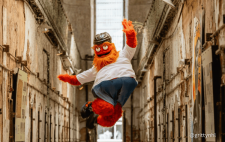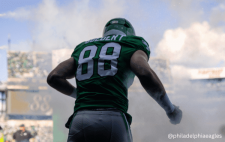photo: David Michael Howarth
Flyers forward Oskar Lindblom was on the verge of a breakout season when a shocking cancer diagnosis put his hockey career on ice. A grueling treatment regimen tested his grit in ways he’d never faced in the rink. But it was his winning attitude that fueled the #OskarStrong movement.
A few seconds.
That’s all it took for Oskar Lindblom’s world to spin off its axis.
Up until that day in December, 2019, the then-23-year-old hockey player pretty much had the world by the tail. Lindblom had already beaten astronomical odds. From a small city in Sweden where he learned to skate, he was playing the game he loved at the highest imaginable level. As a forward for the Philadelphia Flyers, he was a standout among a group of exciting young players fueling a promising season.
And then, in a flash, everything he had worked for was in jeopardy.
“I remember there was just that emptiness that was going through my whole body right away,” says Lindblom of that awful moment when he found out that a welt on his ribcage was definitely not the result of a hard hockey hit.
It was cancer, and it was serious.

Oskar Lindblom with Penn’s Abramson Cancer Center nurses after completing his final round of chemotherapy
Lindblom was diagnosed with Ewing’s sarcoma, a rare form of bone cancer that strikes mostly teenage boys and young men. The news came as a shock – like many people facing serious health issues, he brushed off the early signs that something was wrong.
“It started as a little lump on my rib. I thought I got hit or something because I had a bruise on it,” Lindblom says. “So I didn’t think about it that much. And then it started growing a little bit. I didn’t feel pain when I was playing, but more when I got hit hard or when I was sleeping on that side. But otherwise, it wasn’t bad.”
So he ignored it, and it didn’t seem to affect his game. By mid-December, he was tied for first in team goals and on a serious roll. But on the insistence of his girlfriend, he relented and got the welt examined. Within weeks he learned the life-altering news.
“When you hear those words, it’s just tough to take in,” Lindblom says. “And then I started thinking about life and hockey, about how I was going to work to beat it.”
Lindblom left the team in Denver, Co. to get started on his mission. In the care of specialists at Penn Medicine’s Abramson Cancer Center, his chemotherapy regimen initially involved infusions of a tumor-destroying chemical brew every other week. Toward the end of the campaign, that was cut back to every 3 weeks. The treatment was followed by surgery on his rib once he recovered from the strength-sapping chemo.
As a player used to getting hit on the ice, Lindblom says it wasn’t the physical effects like nausea and exhaustion that bothered him that much.
What was harder to contend with, he says, was the psychological toll. Because of the pandemic, his friends and family in Sweden could not visit after March. What did sustain him, he says, is the incredible outpouring of support from not just his teammates and Philly’s passionate hockey fans but also hockey players from rival teams and beyond. Even people with no interest in hockey were rooting for him.
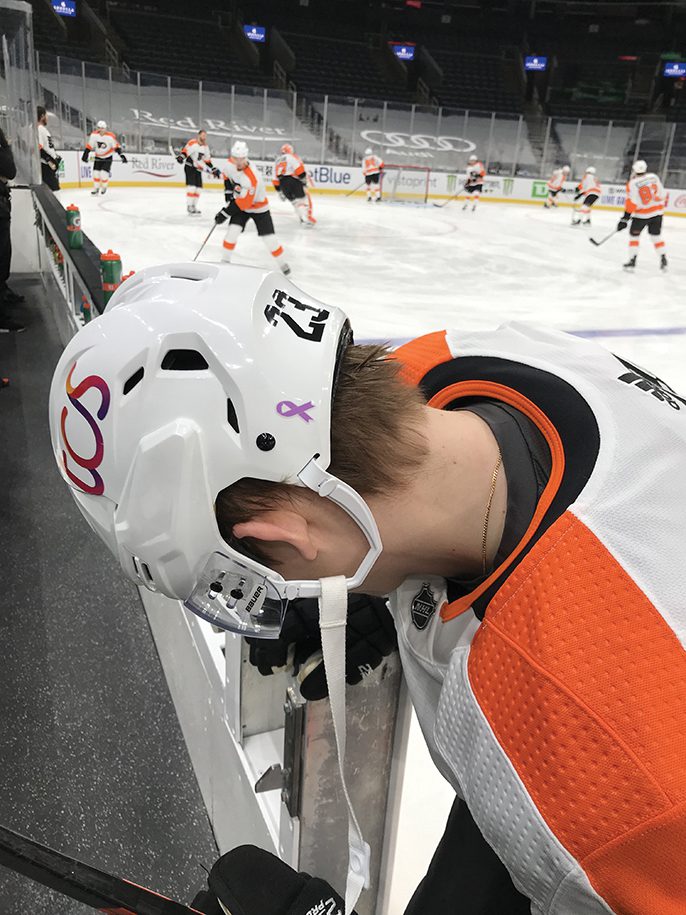
Lindblom’s helmet with a cancer awareness ribbon
#OskarStrong began as a way for the Flyers to honor their stricken teammate. After Lindblom’s diagnosis was revealed, the team wore black and purple T-shirts with the #OskarStrong slogan at a home game. Soon, demand for the shirts – which raised money for Hockey Fights Cancer – skyrocketed.
During the early months of his treatment, anytime Lindblom showed up for games or practices, it became an occasion for celebration. At a home game early last year, fans arrived to thousands of “I Fight for Oskar” signs taped to their chairs. And an emotional ovation erupted when Lindblom appeared on the arena’s Jumbotron during the first period.
As the NHL community rallied behind Lindblom’s fight to beat cancer, he says it only reinforced his unwavering belief that he was headed toward the best of all possible outcomes: good health and a return to the Flyers.
“There were never any doubts,” says Lindblom. “The doctors were always so positive about me, and there was really never any bad news. So I could just focus on going forward, going through the next chemo and counting the days until I was done.”
As Flyers fans know (as well as hockey fans and others around the world), Lindblom did beat it. Not only did he conquer cancer, but it took him less than a year to get back on the ice. Last summer, he joined the Flyers for his first post-diagnosis skate at their Voorhees practice facility. By Sept., he was back on the ice for real.
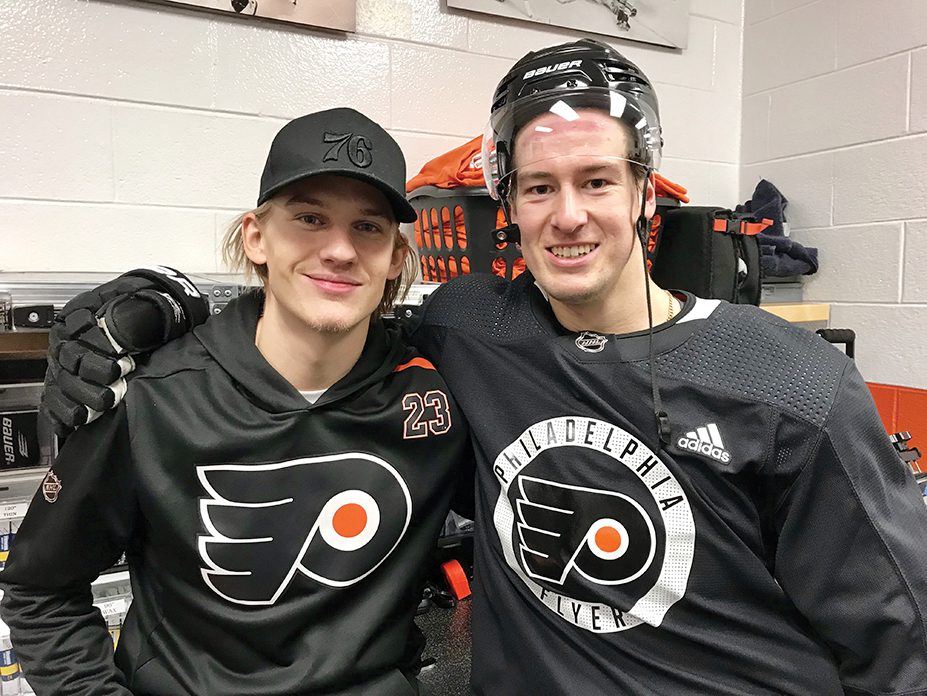
Teammates Oskar Lindblom and Robert Hagg
Head coach Alain Vigneault didn’t wait for a no-pressure situation to ease Lindblom back into the swing of things. Instead, the forward played 17 minutes in a thrilling double-overtime win against the New York Islanders. The victory forced the teams’ second-round Stanley Cup playoff series to a Game 7, winner-take-all showdown. (The Men in Black-and-Orange lost the deciding match.)
Because the 2020-21 season was delayed and shortened due to the pandemic, Lindblom had to wait until earlier this year to score his first post-cancer goal. According to defenseman Robert Hagg, a fellow Swede and Lindblom’s best friend on the team, his pal’s presence ignited a huge boost for the franchise.
“Last year was a tough year for everyone, so seeing him around every single day both on the ice and off the ice brings a lot of energy to the guys,” he says. Hagg adds that Lindblom’s return has provided extra fuel for the team’s competitive fire. “We all saw what he went through last year. Everyone is happy to see him. Every time he comes in, guys have a smile on their faces. It’s awesome to have him back, and I definitely think it gives us more motivation for this year.”
Vigneault, who describes Lindblom as “a great young man with great values and great principals,” likewise believes he brings something special to the table.
“It’s a really strong example having him back with everyone knowing what he had to go through to make it back,” he says. “It’s just a great example to have around our locker room.”
While hockey players wear a good deal of protective padding, the ribs are generally left vulnerable. So it would have been understandable if Lindblom had some hesitation about getting back to play. But he insists he wasn’t concerned.
“I wasn’t worried about it because I practiced for 2 or 3 weeks before that first game, and I didn’t feel anything when I got hit,” Lindblom says. “So I felt pretty confident when I was back on the ice.”
Actually, the Covid restrictions are what frustrated him the most. Lindblom reentered a world that had been seriously altered by the pandemic, and even with the optimistic attitude he’s known for, he isn’t shy about voicing his frustration over the limitations the outbreak has imposed on the league. These days, when the Flyers travel, the squad’s universe is limited to airports, team buses, hotels and nearly empty arenas.
“It’s not the same when you don’t get that energy from the fans when you get out on the ice,” he says of the adrenaline-pumping excitement generated by a packed Wells-Fargo Center. “This isn’t an optimal setup, so we can’t wait to get our fans back. It’s going to be so much fun when they can push us and celebrate with us.”
But he grudgingly accepts life inside the league’s coronavirus bubble. Just like his battle with cancer, he accepts it at face value.
“So long as we do our job and the stuff around us works, then we’re fine,” says Lindblom.
For him, just being back on the ice is a win. Like many cancer survivors, he says he’s less bothered by things that may have annoyed him in the past.
“When I’m tired in the morning, I’ll start complaining,” says Lindblom. “But then I tell myself, ‘You’re not complaining this time. You’re going to get up and you’re going to go back to the rink and have a positive attitude.’”
See 7 ways fans & friends became #OskarStrong…
Wearing your #OskarStrong Pride
After Oskar Lindblom’s diagnosis was announced, his teammates looked for ways to show their support. It was only natural they turned to Biscuit Tees, a fledgling hockey merch business started by someone who is like family: Kim Parent, daughter of Flyers’ icon Bernie Parent.
The resulting #OskarStrong t-shirts were initially designed for a limited run, but the apparel’s popularity changed that. When posts of the team wearing #OskarStrong tees under their uniforms went viral, people around the world wanted in. Suddenly, Biscuit Tees’ website was besieged with purchases.
Kim Parent and co-founder Jodi Smith, both South Jersey residents, went into high gear to meet the demand – with 100% of the proceeds going to the nonprofit Hockey Fights Cancer.
“We originally hoped to raise $1,000, maybe even $5,000, to show our support for a player and a cause that’s so dear to us,” says Parent. “Within a week, we had raised $100,000.”
By the time they wrote the final check to Hockey Fights Cancer, it was for $200,000, and there’s still another on the way (although nowhere near that astronomical amount, Parent says). Suddenly, the business was shipping orders across the United States and to Canada, South Korea, Australia, England, France, Sweden – put your finger on the globe, an #OskarStrong shirt probably made it there.
“We didn’t leave my mom’s basement for weeks,” says Parent. “It took on a life of its own. It was overwhelming, but in a good way.”
Different moments in Lindblom’s journey increased sales, she says. When he rang the cancer bell, new orders came flooding in. The same when he stepped into the bubble for the playoffs.
And support extended far past team loyalties, she says. Washington Capitals’ announcer Eddie Olczyk wore the jersey prior to calling a Caps-Flyers game. And the same week they went on sale, Mika Zibanejad of the New York Rangers, a team that has long shared bad blood with the Flyers, bought 6. “It wasn’t about being a Flyers fan or even a hockey fan for that matter,” Parent says. “Some people weren’t even hockey fans at all, but their parents or friends suffered from Ewing’s sarcoma, and they wanted to show their support.”
On Instagram, Zibanejab showed his support when, under a photo of himself and his teammates wearing the shirts, he wrote, “Some things are bigger than hockey. We’re all #OskarStrong today and every day.”


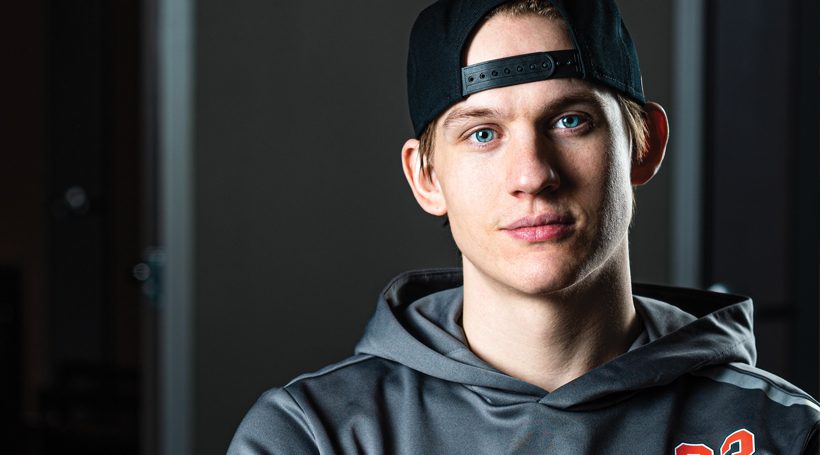
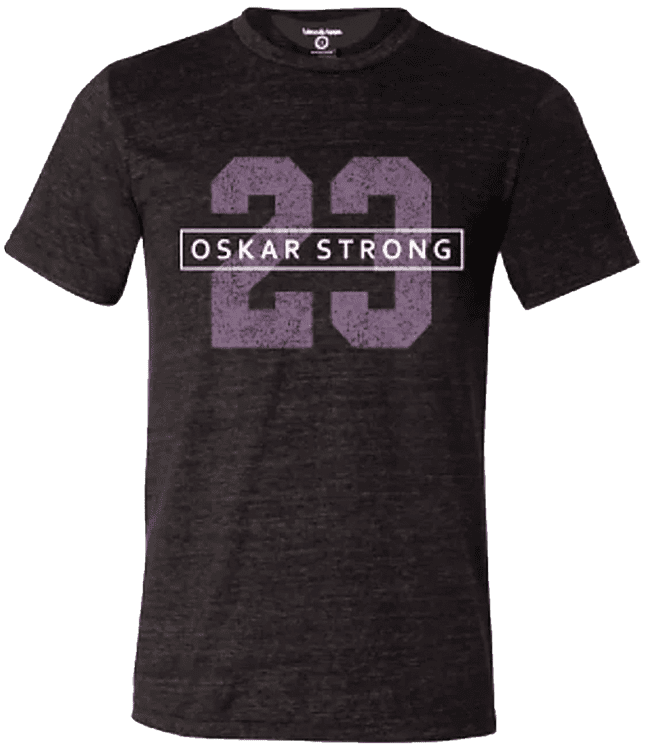 After Oskar Lindblom’s diagnosis was announced, his teammates looked for ways to show their support. It was only natural they turned to Biscuit Tees, a fledgling hockey merch business started by someone who is like family: Kim Parent, daughter of Flyers’ icon Bernie Parent.
After Oskar Lindblom’s diagnosis was announced, his teammates looked for ways to show their support. It was only natural they turned to Biscuit Tees, a fledgling hockey merch business started by someone who is like family: Kim Parent, daughter of Flyers’ icon Bernie Parent.
